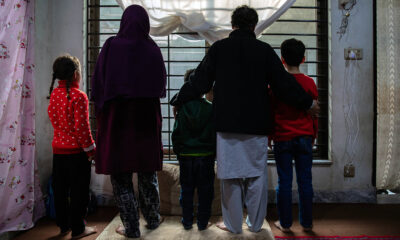Health
Finding COVID-19’s origins is a moral imperative: WHO chief

Discovering the origins of COVID-19 is a moral imperative and all hypotheses must be explored, the head of the World Health Organization said on Saturday.
A U.S. agency was reported by the Wall Street Journal to have assessed the pandemic had likely been caused by an unintended Chinese laboratory leak, raising pressure on the WHO to come up with answers, Reuters reported.
Beijing denies the assessment which could soon become public after the U.S. House of Representatives voted this week to declassify it.
“Understanding #COVID19′s origins and exploring all hypotheses remains: a scientific imperative, to help us prevent future outbreaks (and) a moral imperative, for the sake of the millions of people who died and those who live with #LongCOVID,” Tedros Adhanom Ghebreyesus said on Twitter late on Saturday.
He was writing to mark three years since the WHO first used the word “pandemic” to describe the global outbreak of COVID-19.
Activists, politicians and academics said in an open letter this weekend that the focus of the anniversary should be on preventing a repeat of the unequal COVID-19 vaccine rollout, saying this led to at least 1.3 million preventable deaths.
In 2021, a WHO-led team spent weeks in and around Wuhan, China where the first human cases were reported and said in a joint report that the virus had probably been transmitted from bats to humans through another animal, but further research was needed. China has said no more visits are needed.
Since then, the WHO has set up a scientific advisory group on dangerous pathogens but it has not yet reached any conclusions on how the pandemic began, saying key pieces of data are missing.
Health
Afghan delegation heads to Turkey for medicine talks

Naemullah Ayoubi, Director General of Drug and Health Products Regulation at Afghanistan’s Ministry of Public Health, has departed for Turkey on an official visit accompanied by a technical delegation.
The Ministry of Public Health said the delegation will hold meetings with officials from Turkey’s pharmaceutical regulatory authority and discuss a number of key issues related to the regulation of medicines and health products.
The delegation is also scheduled to visit several pharmaceutical manufacturing factories in Turkey.
According to the ministry, the visit aims to strengthen coordination between the two countries in the production and import of medicines, in order to ensure the availability of high-quality and affordable pharmaceuticals for people in Afghanistan in both the short and long term.
Health
Afghanistan opens first national cancer diagnosis and treatment hospital

The Ministry of Public Health announced on Thursday that Afghanistan has inaugurated its first national hospital dedicated to the diagnosis and treatment of cancer, marking a major step forward in the country’s healthcare services.
The facility, named the National Cancer Diagnostic and Therapeutic Hospital, has officially begun operations and will provide specialized care for cancer patients across the country.
Speaking at the inauguration ceremony, Public Health Minister Noor Jalal Jalali said the 200-bed hospital aims to offer hope and improved treatment options for patients suffering from cancer.
“Fortunately, we are jointly opening a 200-bed hospital for cancer patients, and we hope that this hospital will become a source of hope and healing for those in need,” Jalali said.
The minister added that specialized training programs will soon be launched at the hospital to educate and train domestic medical specialists. He noted that reforms have already been implemented to improve facilities and ensure better healthcare services.
Jalali also emphasized international cooperation in the project, saying that radiotherapy services will be introduced at the hospital with support from India. According to the ministry, India has so far provided $1 million in assistance, including 10 tons of medicines and medical equipment, to support cancer treatment in Afghanistan.
The opening of the hospital is expected to reduce the need for Afghan patients to seek costly cancer treatment abroad and improve access to specialized care inside the country.
Health
Pakistan becomes latest Asian country to introduce checks for deadly Nipah virus

Authorities in Pakistan have ordered enhanced screening of people entering the country for signs of infections of the deadly Nipah virus after India confirmed two cases, adding to the number of Asian countries stepping up controls.
Thailand, Singapore, Hong Kong, Malaysia, Indonesia and Vietnam have also tightened screening at airports, Reuters reported.
The Nipah virus can cause fever and brain inflammation and has a high mortality rate. There is also no vaccine. But transmission from person to person is not easy and typically requires prolonged contact with an infected individual.
“It has become imperative to strengthen preventative and surveillance measures at Pakistan’s borders,” the Border Health Services department said in a statement.
“All travelers shall undergo thermal screening and clinical assessment at the Point of Entry,” which includes seaports, land borders and airports, the department added.
The agency said travellers would need to provide transit history for the preceding 21-day period to check whether they had been through “Nipah-affected or high-risk regions”.
There are no direct flights between Pakistan and India and travel between the two countries is extremely limited, particularly since their worst fighting in decades in May last year.
In Hanoi, the Vietnamese capital’s health department on Wednesday also ordered the screening of incoming passengers at Noi Bai airport, particularly those arriving from India and the eastern state of West Bengal, where the two health workers were confirmed to have the virus in late December.
Passengers will be checked with body temperature scanners to detect suspected cases. “This allows for timely isolation, epidemiological investigation,” the department said in a statement.
That follows measures by authorities in Ho Chi Minh City, Vietnam’s largest city, who said they had tightened health controls at international border crossings.
India’s health ministry said this week that authorities have identified and traced 196 contacts linked to the two cases with none showing symptoms and all testing negative for the virus.
Nipah is a rare viral infection that spreads largely from infected animals, mainly fruit bats, to humans. It can be asymptomatic but it is often very dangerous, with a case fatality rate of 40% to 75%, depending on the local healthcare system’s capacity for detection and management, according to the World Health Organization.
The virus was first identified just over 25 years ago during an outbreak among pig farmers in Malaysia and Singapore, although scientists believe it has circulated in flying foxes, or fruit bats, for thousands of years.
The WHO classifies Nipah as a priority pathogen. India regularly reports sporadic infections, particularly in the southern state of Kerala, regarded as one of the world’s highest-risk regions for Nipah.
As of December 2025, there have been 750 confirmed Nipah infections globally, with 415 deaths, according to the Coalition for Epidemic Preparedness Innovations, which is funding a vaccine trial to help stop Nipah.
-

 Latest News3 days ago
Latest News3 days agoAfghanistan to grant one- to ten-year residency to foreign investors
-

 Latest News5 days ago
Latest News5 days agoTerrorist threat in Afghanistan must be taken seriously, China tells UNSC
-

 Sport4 days ago
Sport4 days agoIndonesia shock Japan to reach historic AFC Futsal Asian Cup final
-

 Sport5 days ago
Sport5 days agoMilano Cortina 2026 Winter Olympics: What You Need to Know
-

 Sport2 days ago
Sport2 days agoIran clinch AFC Futsal Asian Cup 2026 in penalty shootout thriller
-

 Latest News5 days ago
Latest News5 days agoUS Justice Department to seek death penalty for Afghan suspect in National Guard shooting
-

 Latest News3 days ago
Latest News3 days agoAfghanistan says Pakistan is shifting blame for its own security failures
-

 Latest News5 days ago
Latest News5 days agoUzbekistan, Kazakhstan discuss cooperation on Afghanistan
























